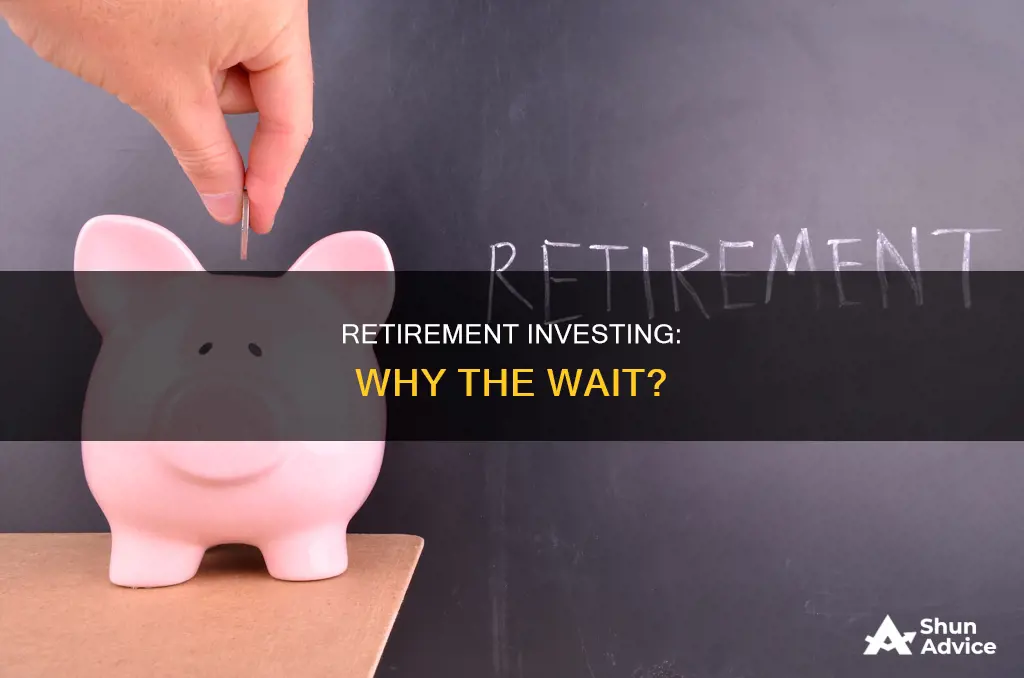
There are many reasons why people hold off investing for retirement. For some, it's because retirement seems like a distant prospect, especially for those in their 20s. Others may be overwhelmed by debt, or be saving up for a home, or be dealing with the death of a spouse or a divorce. Some may also be reluctant to seek help from a financial advisor, or be unsure of how to navigate the process of retirement planning. However, the longer one waits to invest for retirement, the more challenging it becomes to build a sizable nest egg.
| Characteristics | Values |
|---|---|
| Lack of financial literacy | Not knowing how to navigate the process of retirement planning |
| Lack of urgency | Thinking that retirement is far off and there is plenty of time to start saving |
| Lack of funds | Having other financial priorities, such as paying off student loans or credit card debt |
| Lack of discipline | Not being able to set aside a portion of income for retirement savings |
| Lack of trust | Not trusting the stock market or other investment options |

Debt
The interest rates on debt are often higher than the return on retirement savings. For example, if someone is paying an 18% interest rate on credit card debt, and they invest that money instead, receiving a 7% return, they are losing 11% on that money.
People with outstanding debt need to make difficult decisions about their spending habits and budget. They may need to spend less on non-essentials and practice discipline to pay down debt and save for the future.
Experts advise that people should first focus on paying off high-interest debt, such as credit card debt, and then move on to a mix of debt repayment and investing when their debt interest rates are lower than potential stock market returns.
Credit card debt, in particular, should be prioritised for repayment before retirement. Interest rates on credit cards are often very high, and this type of debt can quickly get out of control.
Student loan and mortgage debt are also concerns for people approaching retirement. Student loan debt is increasingly a problem for older people, who may have co-signed loans for their children or grandchildren. Mortgage debt is less of a concern, as rates tend to be low, and investing usually provides a higher return. However, paying off a mortgage can provide emotional relief, and some people may choose to prioritise this.
Overall, while debt can be a significant barrier to investing for retirement, it is possible to manage it through budgeting, discipline, and prioritising high-interest debt.
Investing: A New National Pastime?
You may want to see also

No emergency fund
An emergency fund is a crucial component of financial planning, providing security and stability during unforeseen circumstances such as medical emergencies, job loss, or home and car repairs. However, some people choose to delay investing for retirement due to the absence of an emergency fund. This decision can be influenced by various factors and has important implications for financial security.
Reasons for Delay
People may hold off on investing for retirement due to a lack of emergency funds for several reasons. One common reason is the opportunity cost associated with maintaining idle cash. Individuals may believe that keeping a substantial amount of cash on hand results in a missed opportunity to invest that money in high-return assets. They argue that the potential growth and returns from investing outweigh the benefits of having an emergency fund. Additionally, the low-interest rates offered by traditional savings accounts further discourage people from setting aside funds for emergencies.
Implications
Delaying retirement investments due to the absence of an emergency fund can have significant financial implications. Firstly, it increases the likelihood of individuals dipping into their retirement funds prematurely to cover unexpected expenses. This disrupts their financial plans and can hinder their retirement goals. Secondly, without an emergency fund, individuals may be forced to rely on credit cards or loans to manage unforeseen costs, leading to debt accumulation and additional financial strain.
Recommendations
Financial experts generally recommend having an emergency fund to cover unexpected expenses and protect retirement savings. The recommended amount varies based on individual circumstances but typically ranges from three to six months' worth of living expenses during an individual's working years. As retirement approaches, it may be advisable to increase this amount to cover potential income loss and unexpected costs associated with ageing, such as medical emergencies.
While building an emergency fund, individuals can explore various investment options beyond traditional savings accounts to maximise returns. These include high-yield savings accounts, certificates of deposit (CDs), money market mutual funds, treasury bills and bonds, and short-term bond funds. These options offer varying levels of liquidity, risk, and potential returns, allowing individuals to choose based on their financial goals and risk tolerance.
Congress' Stock Secrets
You may want to see also

Saving for a home
Build a Better Budget
Calculate your monthly take-home pay, including your spouse's or partner's income if they will be contributing. Determine your monthly expenses, including necessities like rent, student loan payments, groceries, and utilities, as well as non-essentials like entertainment and dining out. From there, you can identify areas where you can cut back and set a realistic budget.
Downsize
Consider downsizing your living arrangements to reduce expenses and live below your means. You can divert the extra money you save into your home fund. For example, you could move to a cheaper apartment or get a roommate to split the costs.
Reduce Expenses and Cut Bad Habits
Identify any unhealthy habits or unnecessary expenses that you can cut back on, such as impulse shopping, subscription services, or eating out frequently. Cooking meals at home instead of ordering takeout or fast food can also help you save money and improve your health.
Pick Up a Side Hustle
Consider taking on a side hustle or freelance work to increase your income. This could be driving for a ridesharing company, selling products online, or offering freelance services.
Chop Down Your Debt
Before applying for a mortgage, focus on reducing your debt to improve your debt-to-income ratio. Lenders will consider this ratio when evaluating your mortgage application, and a higher ratio may impact your ability to qualify for a loan or result in a higher interest rate.
Automate Your Savings
Set up automatic withdrawals from your primary account into a separate savings account dedicated to your home fund. This will help you stay disciplined and reduce the temptation to spend the money on other things.
Remember, while saving for a home is a valid reason to pause retirement investments, it's important to keep this pause temporary, ideally lasting only a few months to a year or two at most.
Education and Investment: Any Correlation?
You may want to see also

Loss of a spouse
Losing a spouse, whether through death or divorce, can be a difficult and emotional time. It is understandable that people may hold off investing for retirement during this period. There are a few reasons why this major life event may cause a delay in retirement planning.
Firstly, it is important to give yourself time to process the loss and let your emotions settle. Major life changes can impact your financial situation, and you may need a clear head to navigate the changes in your budget. For example, if you are now a single filer, you may be pushed into a higher tax bracket. Additionally, you may have to pay for funeral costs, which can amount to several thousand dollars.
Secondly, it is recommended to consult a professional to help you navigate market chaos, inflation, and your future financial plans. It may take some time to understand your new financial picture. For instance, if your spouse had a pension, you may need to clarify whether there is a survivor benefit. Similarly, if you are now a widow or widower, you will need to understand your new Social Security situation, as you may now only be able to keep the higher of the two benefit checks.
Finally, it is important to ensure that you have sufficient funds to cover your daily expenses and any emergencies that may arise. While you may need to put new investing decisions on hold, it is crucial to keep paying the bills and maintaining your standard of living.
While it is understandable to delay retirement planning during this challenging time, it is also essential to resume investing for your future as soon as possible.
Starbucks: Worth Your Investment?
You may want to see also

Other major life events
Major life events such as job loss or a medical emergency can cause people to pause their retirement savings and start living off their emergency funds. In such situations, it is crucial to focus on replenishing the emergency fund as soon as possible. This ensures that individuals can resume their retirement contributions and maintain their financial security for the future.
Additionally, individuals may experience other significant life changes, such as the loss of a spouse through death or divorce. During these challenging times, it is important to give oneself time to process the emotions and make sense of the new financial situation. Seeking the guidance of a financial professional can be beneficial in navigating these transitions.
It is also important to remember that retirement planning should not be put off indefinitely. Once individuals have addressed their immediate needs and regained financial stability, they should resume their retirement contributions as soon as possible to stay on track for their future goals.
Investing: Separating Fact from Fiction
You may want to see also
Frequently asked questions
Investing for retirement can feel abstract when you're in your 20s, and many people are paying off student loans or managing finances for the first time. It's common to think you have your whole life ahead of you and plenty of time to start saving.
People may also hold off investing for retirement because they are in debt, don't have an emergency fund, or are saving for a home.
Some common retirement mistakes include not creating a financial plan, not contributing to a 401(k) or similar retirement plan, taking social security distributions too early, not rebalancing portfolios to match risk tolerance, and spending beyond one's means.







